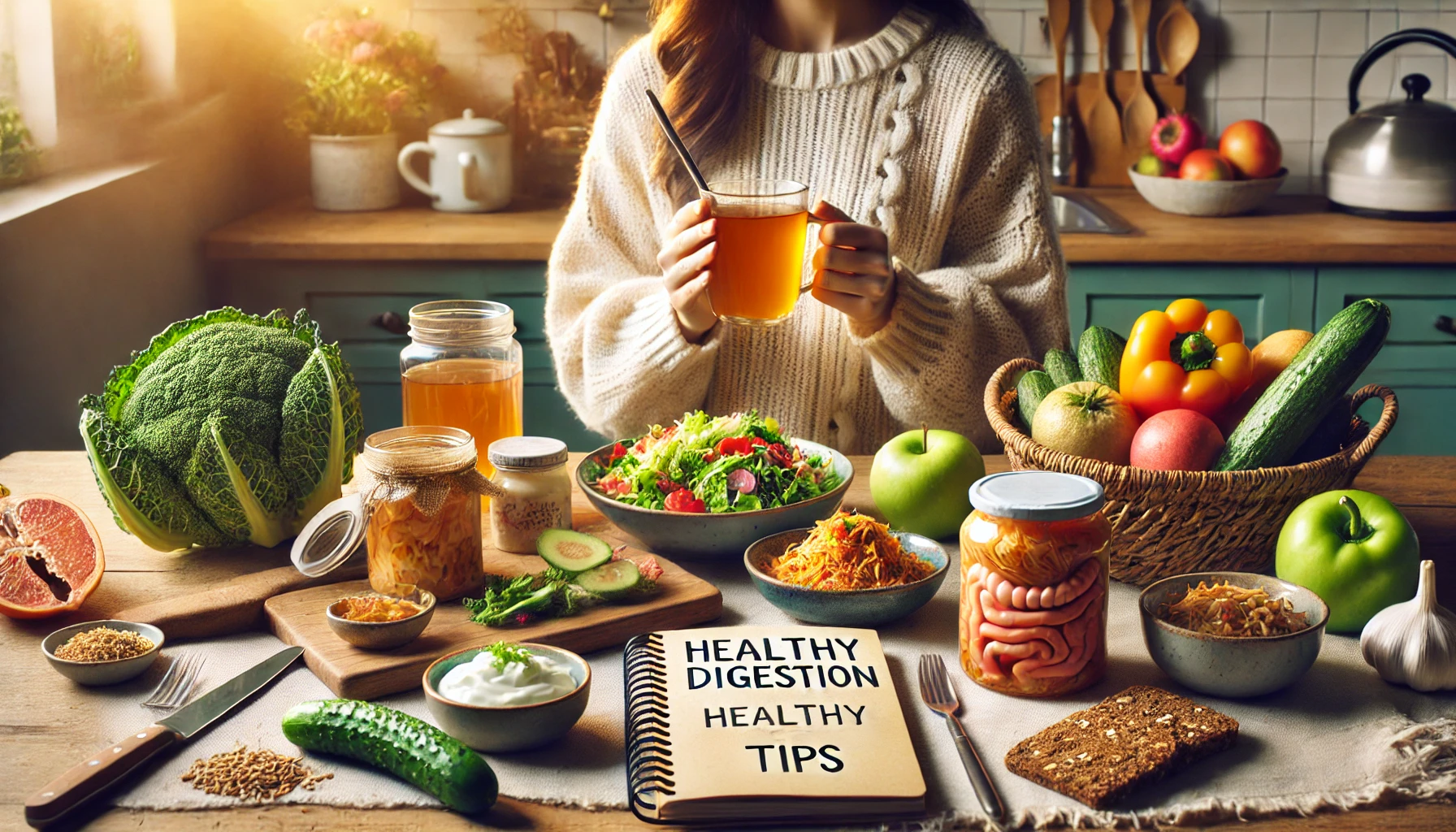Good digestion is essential for overall health. When your digestive system works properly, your body absorbs nutrients efficiently, prevents discomfort, and boosts energy levels. However, poor digestion can lead to bloating, constipation, acid reflux, and other digestive issues. Here are natural ways to improve digestion and support gut health.
1. Eat More Fiber-Rich Foods
Fiber plays a crucial role in digestion by keeping your bowel movements regular and supporting gut bacteria. There are two types of fiber:
✅ Soluble fiber – Helps absorb water and slows digestion (found in oats, beans, apples).
✅ Insoluble fiber – Adds bulk to stool and prevents constipation (found in whole grains, nuts, and vegetables).
🌿 Best fiber-rich foods:
✔️ Leafy greens (spinach, kale, lettuce)
✔️ Whole grains (brown rice, quinoa, whole wheat bread)
✔️ Legumes (lentils, beans, chickpeas)
✔️ Berries (strawberries, blueberries, raspberries)
A balanced diet with both types of fiber promotes smoother digestion and gut health.
2. Stay Hydrated
Water is essential for breaking down food and moving it through your digestive tract. Dehydration can cause constipation and bloating.
💧 Tips to stay hydrated:
✔️ Drink at least 8 glasses of water daily.
✔️ Start your day with a glass of warm water to stimulate digestion.
✔️ Consume hydrating foods like cucumbers, oranges, and watermelon.
Avoid sugary sodas and excessive caffeine, as they can irritate the stomach.
3. Eat Slowly and Chew Your Food Well
Digestion starts in the mouth. Chewing food thoroughly helps your stomach process it more efficiently.
🍽️ How to improve chewing habits:
✔️ Take small bites and chew at least 20-30 times per bite.
✔️ Avoid rushing meals—eat mindfully.
✔️ Put down your fork between bites to slow down.
This simple habit reduces bloating and improves nutrient absorption.
4. Include Probiotics and Fermented Foods
Your gut contains trillions of bacteria that affect digestion. Probiotics are beneficial bacteria that help balance gut health.
🥛 Best probiotic foods:
✔️ Yogurt (with live cultures)
✔️ Kefir (fermented milk drink)
✔️ Sauerkraut and kimchi (fermented cabbage)
✔️ Miso and tempeh (fermented soy products)
Adding probiotics to your diet supports a healthy gut and reduces digestive discomfort.
5. Reduce Processed Foods and Excess Sugar
Processed foods contain artificial additives and preservatives that can disrupt gut bacteria. Excess sugar can feed harmful bacteria, leading to digestive imbalances.
🚫 Foods to avoid:
❌ Fast food and fried foods
❌ Sugary snacks and soft drinks
❌ Artificial sweeteners (can cause bloating and gas)
Opt for natural, whole foods instead to keep your gut healthy.
6. Manage Stress Levels
Stress directly impacts digestion by slowing down the digestive process or causing issues like stomach pain and acid reflux.
🧘 Ways to reduce stress for better digestion:
✔️ Practice deep breathing exercises.
✔️ Try yoga or meditation to relax.
✔️ Take short breaks and get fresh air during the day.
Lower stress means better digestion and fewer stomach problems.
7. Exercise Regularly
Physical activity helps move food through your digestive system, reducing bloating and constipation.
🏃 Best exercises for digestion:
✔️ Walking after meals (aids digestion and prevents bloating).
✔️ Yoga poses that stimulate digestion (like twists and forward bends).
✔️ Light stretching to relieve stomach discomfort.
A sedentary lifestyle can slow digestion—stay active to keep your gut functioning well.
8. Avoid Overeating and Late-Night Meals
Eating large meals can overwhelm your digestive system, leading to acid reflux, bloating, and discomfort.
🍽️ Healthy eating habits:
✔️ Eat smaller, balanced meals throughout the day.
✔️ Avoid eating right before bedtime (give your body 2-3 hours to digest).
✔️ Stop eating when you feel 80% full instead of overly stuffed.
Listening to your body helps prevent digestive issues.
9. Try Herbal Teas for Digestion
Certain herbal teas contain compounds that soothe the digestive tract and relieve bloating.
🍵 Best teas for digestion:
✔️ Ginger tea – Reduces nausea and bloating.
✔️ Peppermint tea – Soothes an upset stomach.
✔️ Chamomile tea – Calms the digestive system and reduces inflammation.
A warm cup of herbal tea after meals can support healthy digestion.
10. Listen to Your Body
Everyone’s digestion is unique. If you experience frequent bloating, gas, or discomfort, take note of which foods trigger symptoms.
📔 Keep a food diary to track patterns in your digestion.
👩⚕️ Consult a doctor if digestive issues persist.
Understanding your body helps you make better dietary choices.
Final Thoughts
Improving digestion naturally doesn’t require drastic changes—small adjustments in diet, hydration, stress management, and lifestyle can make a big difference. By eating whole foods, staying active, and listening to your body, you can enjoy better digestion and overall well-being.
Start implementing these habits today for a healthier gut and a happier life!
